7 Tips How Nonprofits Should Do Their Bookkeeping
- David Bialecki
- Sep 11, 2025
- 4 min read

Bookkeeping for a nonprofit organization is more than just tracking dollars and cents. It’s about accountability, compliance, and ensuring your mission has the financial foundation to thrive. Unlike for-profit businesses, nonprofits must carefully manage funds, comply with reporting requirements, and maintain donor trust. Here’s how nonprofits can set up and manage their bookkeeping effectively.
1. Understand Nonprofit Accounting Basics
Nonprofits operate differently than traditional businesses. Instead of focusing on profit, they focus on accountability for funds received and spent. This means money may come with restrictions (e.g., grants for a specific project). You must track each dollar according to its purpose. Asset categories are classified differently. Instead of equity, nonprofits classify funds as unrestricted, temporarily restricted, or permanently restricted. Finally, reporting obligations are a little different. Nonprofits must provide accurate financial reports to board members, donors, and regulators, not owners the way a for-profit company does.
2. Use the Right Accounting System
A basic spreadsheet won’t cut it for most nonprofits. Specialized accounting software designed for nonprofits, such as QuickBooks for Nonprofits, Aplos, or Blackbaud—makes it easier to:
· Track restricted vs. unrestricted funds.
· Generate donor contribution reports.
· Prepare Form 990 and other compliance filings.
· Run reports tailored to board meetings and grant applications.
For many non-profits, the goal isn’t to make as much profit as possible. It’s not to show a loss. This proves to donors, and potential donors, that the non-profit is managing the donor’s money well by sticking to the mission statement of the organization and spending every dollar as responsibly as possible.
3. Keep Accurate Records of Donations and Grants
Donor trust is at the heart of nonprofit success. Always maintain donation receipts with donor name, amount, and any restrictions, grant agreements detailing how funds may be spent, and acknowledgment letters for donors (often required for tax deductions). Accurate donor records not only help with compliance but also strengthen relationships and future fundraising efforts.
Donors don’t just hand out grants and donations to anyone. It’s only after they’ve fully vetted your organization will they even consider making a donation or issuing a grant. Once they do, they will follow up, and follow up some more, to confirm their money is spent wisely. Take keeping accurate records seriously. Not every nonprofit has the budget for a full-time bookkeeper, but that doesn’t mean finances should be neglected. Some options include hiring a part-time bookkeeper, outsourcing to a CPA firm that specializes in nonprofits, or using volunteers with professional accounting backgrounds.
4. Separate Personal and Organizational Finances
Even in small nonprofits, it’s critical to open a dedicated bank account for the organization. Mixing personal and nonprofit funds can lead to confusion, compliance issues, and loss of credibility. This is true for any business, whether it’s for-profit or not-for-profit. If you’re ever sued, the courts will likely consider all assets if they are mixed. Protect not only yourself, but also your non-profit organization against litigation.
5. Maintain Internal Controls
Fraud and misuse of funds can be devastating for nonprofits. Strong internal controls include:
· Requiring two signatures for large checks or transfers.
· Separating duties (e.g., the person recording donations should not also deposit them).
· Regularly reconciling bank statements.
If you have a particularly large donor, they may require annual audits. Internal controls are one of the biggies when conducting an audit. In fact, it may be to your benefit to conduct annual audits to increase your credibility with potential donors
6. Prepare Financial Reports
Nonprofits should produce monthly or quarterly financial statements, including:
· Statement of Financial Position (like a balance sheet).
· Statement of Activities (like a profit and loss statement).
· Cash flow statements.
These reports help the board of directors monitor financial health and ensure accountability to stakeholders. Unlike small proprietors or Single Member LLC’s, there are usually many more eyes on these reports. Expect detailed questions, even some that may make you a little uncomfortable.
7. Stay Compliant With IRS and State Regulations
In the U.S., nonprofits must file Form 990 annually to maintain tax-exempt status. Depending on the size of the nonprofit, there may also be state-level filings, audits, or donor disclosure requirements. Failing to stay compliant can result in penalties or even loss of nonprofit status. This is easily one of the more overlooked parts of operating a non-profit organization, especially the newer ones. There is a cost with not having to pay taxes. That cost comes in the form of a lot of paperwork with stringent requirements.
Conclusion
Bookkeeping may not be the most exciting part of running a nonprofit, but it is essential. Accurate financial management builds donor trust, ensures compliance, and supports long-term sustainability. By investing time and resources into proper bookkeeping, nonprofits can focus more on what matters most—advancing their mission and making a difference.
Is your business where you want it to be? If not, as always, you can contact me for a free consultation.
Dream Big. Think Big. Go Big.















Comments